9 Best Herbal Tinctures For Earache
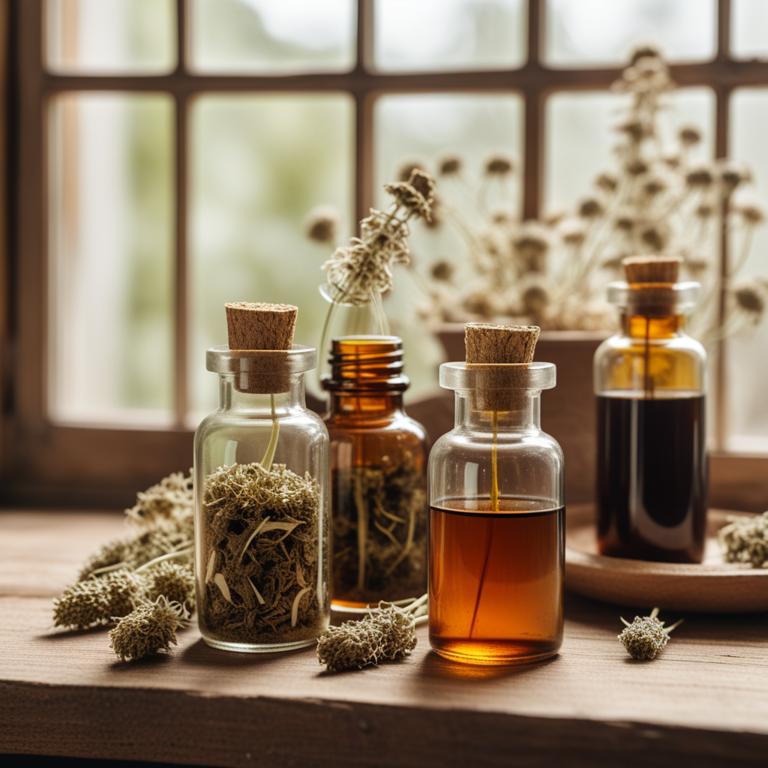
Herbal tinctures for Earache are concentrated liquid extracts made from plants, flowers, and herbs that have been used for centuries to alleviate earache symptoms.
These natural remedies offer several benefits, including reduced inflammation, pain relief, and improved overall ear health.
Examples of herbal tinctures used to treat earache include garlic tincture, which has antimicrobial properties to combat infections, and mullein tincture, which reduces inflammation and soothes ear discomfort.
Other effective herbal tinctures for earache include echinacea tincture, which boosts the immune system, calendula tincture, which promotes wound healing, and tea tree oil tincture, which has antiseptic properties to prevent infections.
According to "Archives of Pediatrics & Adolescent Medicine", tinctures for earache using Otikon Otic Solution, a naturopathic herbal extract containing Allium sativum, Verbascum thapsus, Calendula flores, and Hypericum perforatum in olive oil, have been proven to be as effective as Anaesthetic ear drops in managing ear pain associated with acute otitis media (AOM).
Below there's a list of the 9 best herbal tinctures for earache.
- 1. Echinacea purpurea tinctures
- 2. Hydrastis canadensis tinctures
- 3. Hypericum perforatum tinctures
- 4. Ginkgo biloba tinctures
- 5. Ulmus rubra tinctures
- 6. Arctium lappa tinctures
- 7. Avena sativa tinctures
- 8. Euphrasia officinalis tinctures
- 9. Hamamelis virginiana tinctures
Also you may be interested in...
TODAY'S FREE BOUNDLE
Herb Drying Checklist + Herbal Tea Shopping List + Medicinal Herbs Flashcards
Enter you best email address below to receive this bundle (3 product valued $19.95) for FREE + exclusive access to The Aphotecary Letter.
$19.95 -> $0.00
1. Echinacea purpurea tinctures

Echinacea purpurea tinctures have been traditionally used to treat earache ailments due to their anti-inflammatory and antimicrobial properties, which help to reduce pain and prevent infection.
The bioactive constituents of Echinacea purpurea, such as alkylamides and glycosides, have been shown to exhibit immunomodulatory effects, thereby supporting the body's natural defense against infections and promoting healing.
By acting as a natural analgesic and anti-inflammatory agent, Echinacea purpurea tinctures help to alleviate earache symptoms, including pain and discomfort, and support the body's natural recovery process.
The benefits of using Echinacea purpurea tinctures to treat earache include their non-invasive and non-addictive nature, making them a popular herbal remedy for individuals seeking a natural approach to pain management.
2. Hydrastis canadensis tinctures
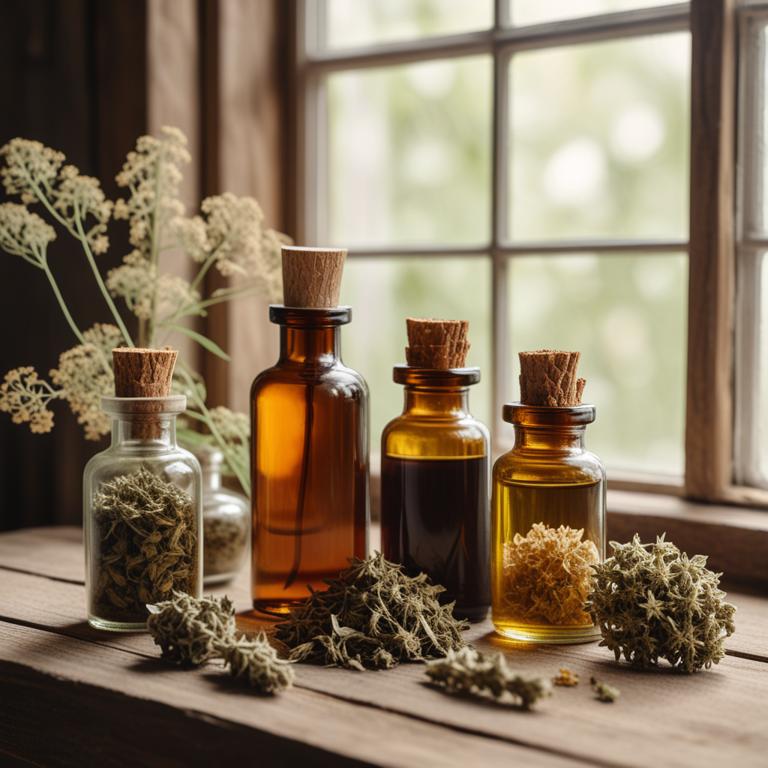
Hydrastis canadensis tinctures, also known as goldenseal, have been used traditionally to treat earache due to its anti-inflammatory and antimicrobial properties.
The bioactive constituents of goldenseal, such as berberine, hydrastine, and canadine, help to reduce inflammation and combat bacterial and fungal infections that may be causing the earache.
By reducing inflammation and killing the underlying infection, Hydrastis canadensis tinctures can provide relief from the pain and discomfort associated with earaches.
The benefits of using goldenseal tinctures to treat earaches include natural pain relief, reduced risk of antibiotic resistance, and a potential reduction in the need for medical intervention.
3. Hypericum perforatum tinctures
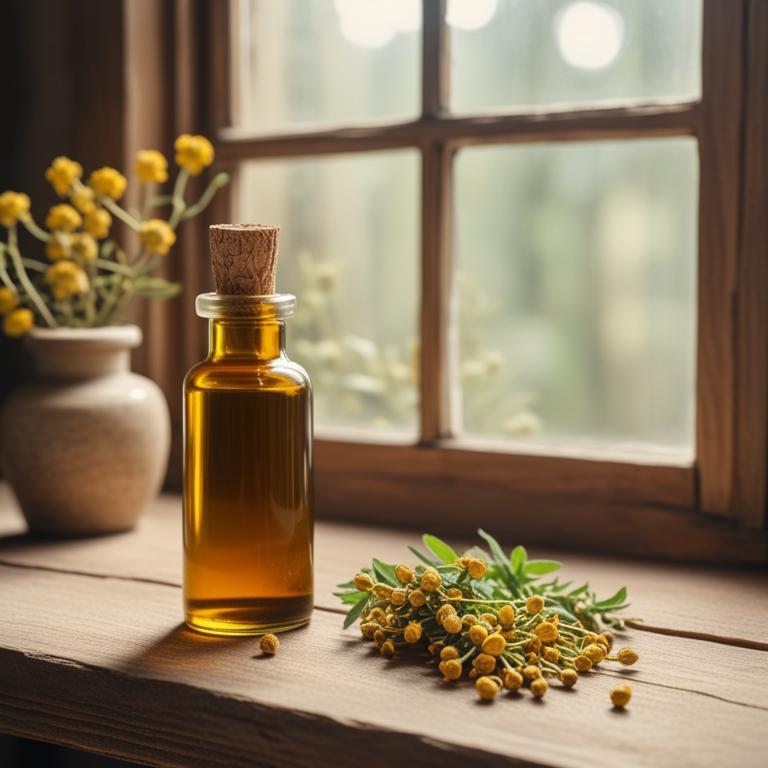
Hypericum perforatum tinctures, also known as St. John's Wort, have been traditionally used to treat earache due to their anti-inflammatory and analgesic properties.
This herbal preparation helps to treat earache by reducing inflammation and pain in the affected area, making it easier to manage the discomfort associated with this ailment.
The bioactive constituents of Hypericum perforatum tinctures, including hyperforin and hypericin, contribute to their therapeutic effects by exerting antioxidant, antimicrobial, and anti-inflammatory actions, which help to alleviate earache symptoms.
The benefits of using Hypericum perforatum tinctures to treat earache include their natural origin, non-addictive properties, and potential to reduce the need for conventional pain medications, making them a popular choice for those seeking a holistic approach to pain management.
Related Study
According to "International journal of clinical pharmacology and therapeutics", Hypericum perforatum tinctures, as part of the fixed combination in Otovowen, were associated with a significant reduction in the use of antibiotics without disadvantage to the clinical outcome in the management of uncomplicated acute otitis media in childhood.
4. Ginkgo biloba tinctures

Ginkgo biloba tinctures have been traditionally used to treat earache, a painful condition caused by inflammation and infection in the ear.
The anti-inflammatory and antimicrobial properties of Ginkgo biloba tinctures help to reduce swelling and combat bacterial and fungal infections in the ear, thereby alleviating the symptoms of earache.
The bioactive constituents of Ginkgo biloba tinctures, such as flavonoids and terpenoids, exhibit their therapeutic effects by modulating the immune response and inhibiting the growth of pathogenic microorganisms.
Regular use of Ginkgo biloba tinctures can provide relief from earache and its associated discomfort, promoting overall ear health and preventing further complications.
Related Study
According to "American journal of health-system pharmacy : AJHP : official journal of the American Society of Health-System Pharmacists", Ginkgo biloba tinctures for earache are potentially safe, as listed in the study among potentially safe herbs for various conditions.
5. Ulmus rubra tinctures
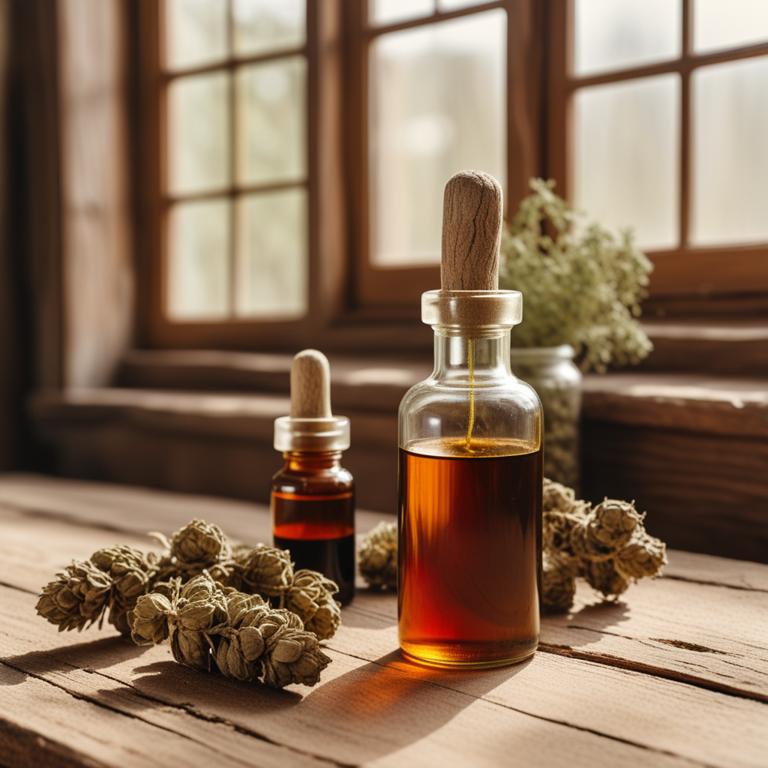
Ulmus rubra tinctures, derived from the bark of the Red Elm tree, possess anti-inflammatory and antimicrobial properties that help to treat earache.
The bioactive constituents, including salicin and oligomeric proanthocyanidin complexes (OPCs), exhibit analgesic and antiseptic effects, which help to alleviate pain and prevent infections in the ear.
By reducing inflammation and combating bacterial growth, Ulmus rubra tinctures provide relief from earache symptoms, such as pain and discomfort.
The benefits of using Ulmus rubra tinctures to treat earache include natural and non-invasive pain management, reduced risk of antibiotic resistance, and promotion of overall ear health.
6. Arctium lappa tinctures
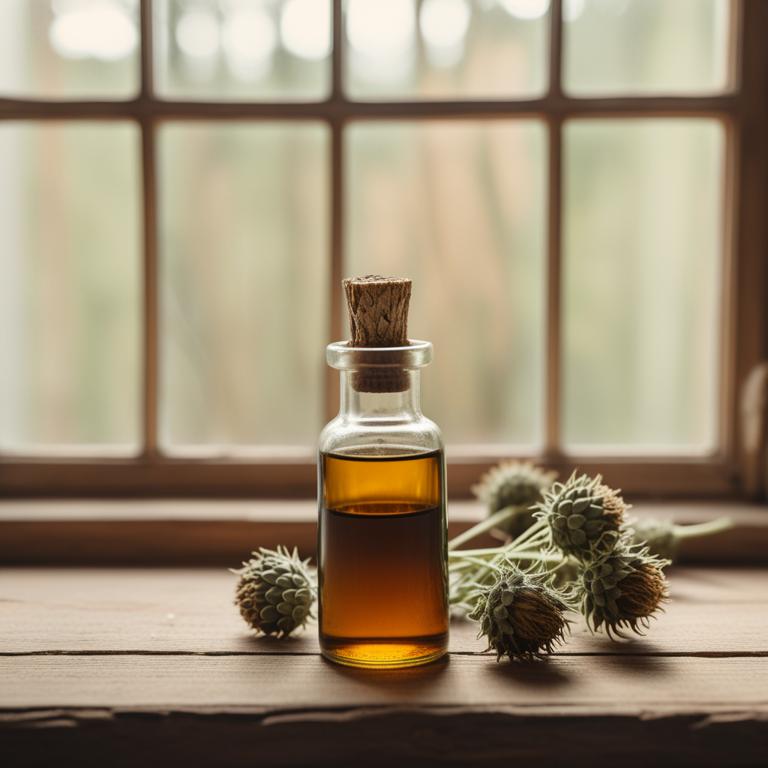
Arctium lappa tinctures, a herbal preparation derived from the burdock plant, have been traditionally used to treat earache, a painful condition characterized by inflammation and infection of the ear canal.
The anti-inflammatory and antibacterial properties of Arctium lappa tinctures help to reduce swelling and fight off bacterial infections, thereby alleviating the symptoms of earache.
The bioactive constituents, such as inulin, arctigenin, and lappaol, in Arctium lappa tinctures are responsible for its therapeutic effects, including its ability to reduce pain and inflammation.
The use of Arctium lappa tinctures as a natural remedy for earache offers several benefits, including its safety profile, ease of use, and potential for reducing the need for antibiotics.
7. Avena sativa tinctures
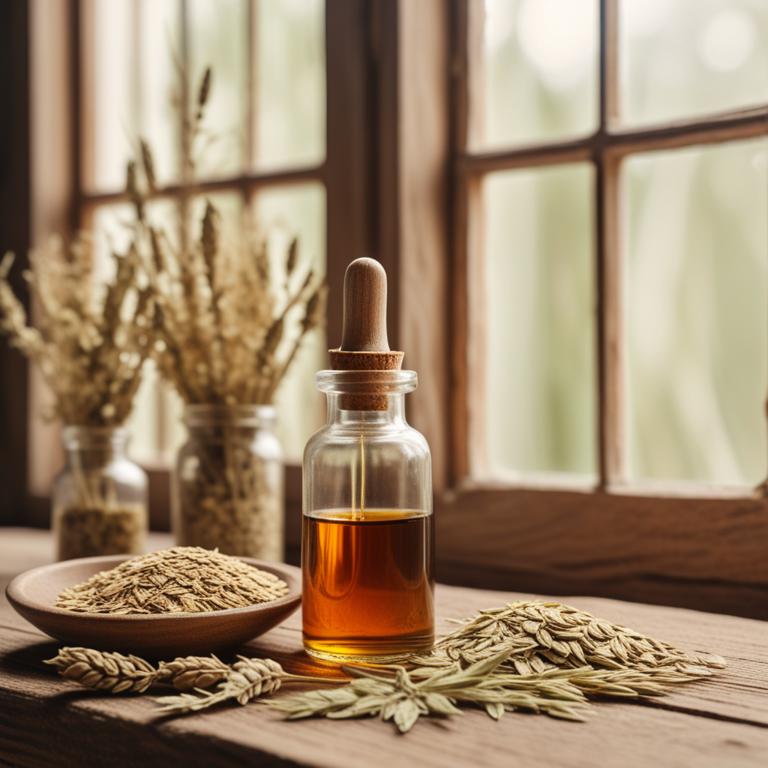
Avena sativa tinctures have been traditionally used to treat earache ailments, leveraging its anti-inflammatory and analgesic properties to provide relief from pain and discomfort.
The herbal preparation helps to treat earache by reducing inflammation and soothing the affected area, thereby alleviating the associated pain and pressure.
The bioactive constituents of Avena sativa, including avenanthramides and ferulic acid, contribute to its therapeutic effects, helping to relax the ear muscles and improve blood circulation to the affected area.
By using Avena sativa tinctures, individuals can benefit from a natural and non-invasive approach to managing earache, promoting a sense of calm and well-being while reducing the reliance on conventional pain medications.
8. Euphrasia officinalis tinctures
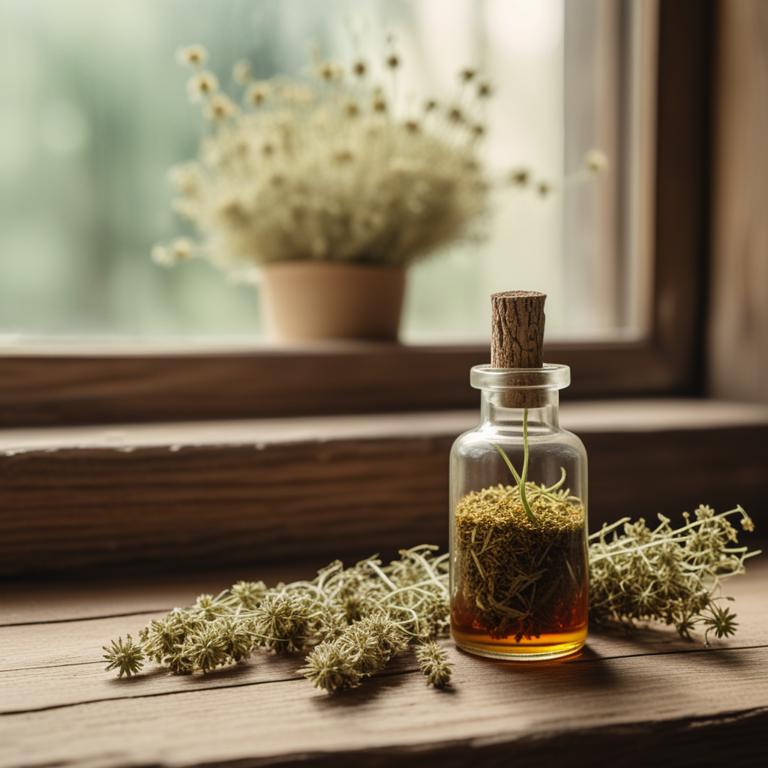
Euphrasia officinalis tinctures have been traditionally used to treat earache, a painful condition characterized by inflammation and infection of the ear.
The herbal preparation contains bioactive constituents such as flavonoids and phenolic acids, which exhibit anti-inflammatory and antimicrobial properties that help to reduce swelling and combat infection in the ear.
By reducing inflammation and infection, Euphrasia officinalis tinctures help to alleviate the pain and discomfort associated with earache, providing relief and promoting healing.
The benefits of using Euphrasia officinalis tinctures to treat earache include their non-invasive nature, ease of use, and minimal side effects, making them a popular natural remedy for this common ailment.
9. Hamamelis virginiana tinctures
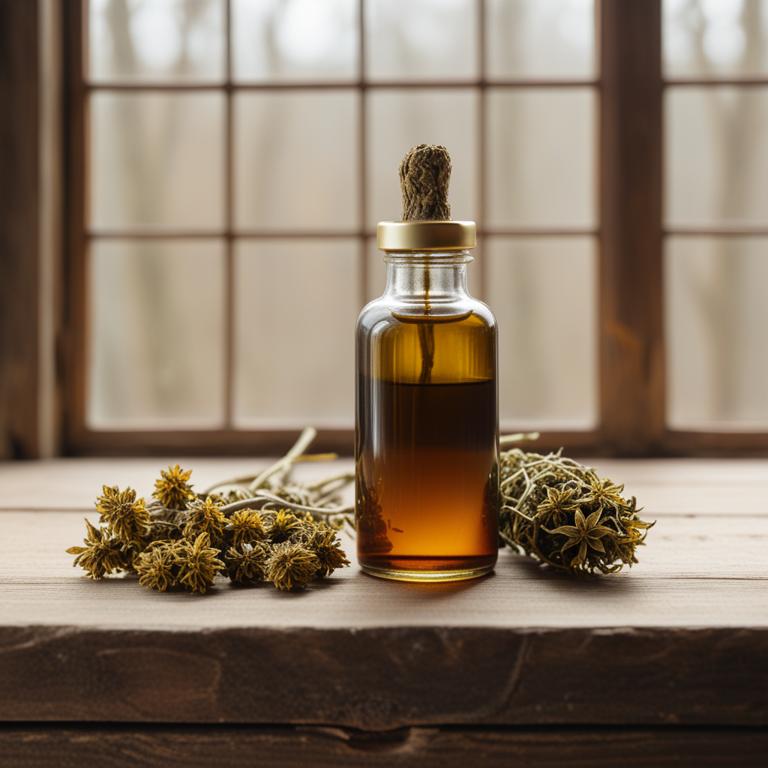
Hamamelis virginiana tinctures have been traditionally used to treat earache ailments due to their anti-inflammatory and antimicrobial properties.
The tannins and phenolic compounds present in Hamamelis virginiana help to reduce inflammation and combat bacterial infections in the ear, thereby alleviating the symptoms of earache.
The bioactive constituents, such as hamamelitannin, help to constrict blood vessels and reduce swelling, while the antimicrobial properties prevent the growth of pathogens that can cause ear infections.
The benefits of using Hamamelis virginiana tinctures to treat earache include quick relief from pain and discomfort, reduced risk of complications, and a natural alternative to conventional medications.